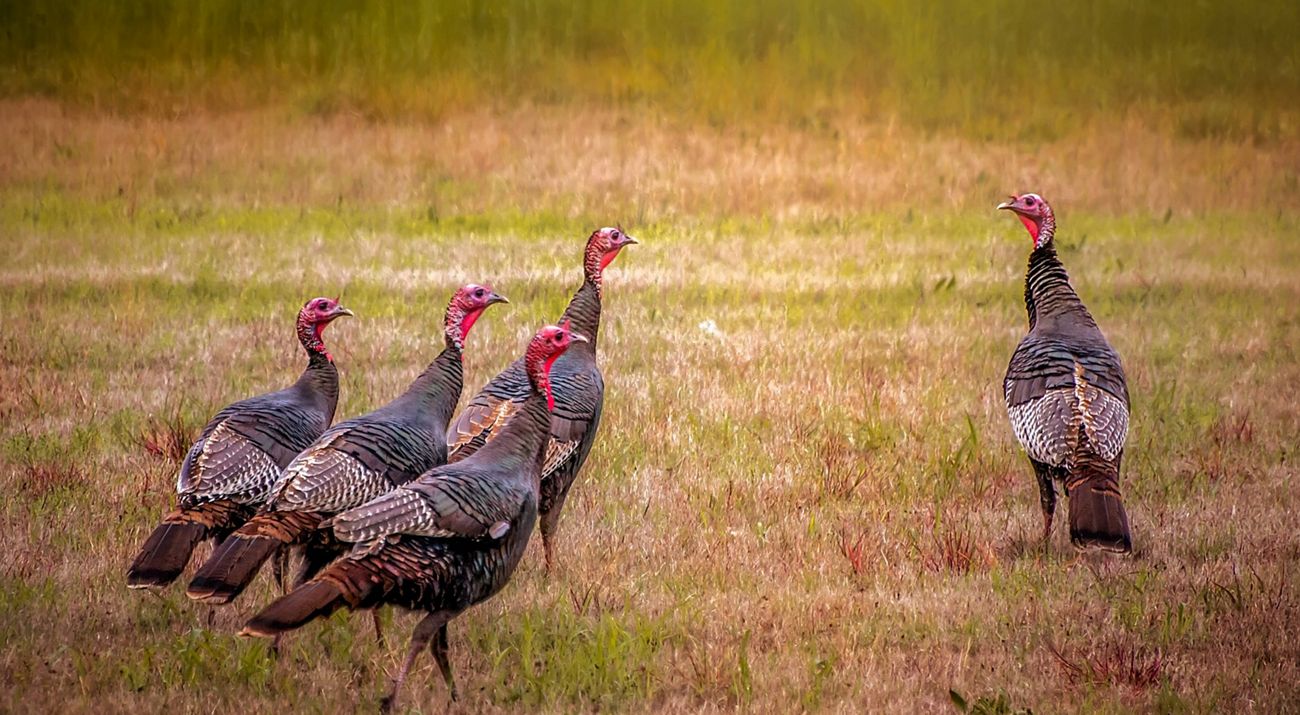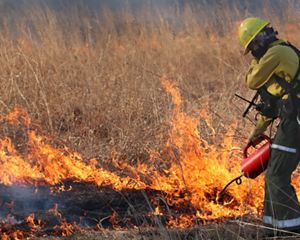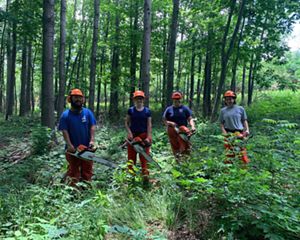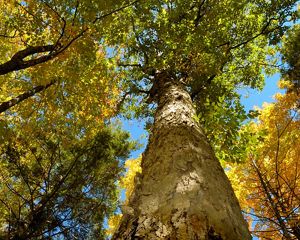
Wisconsin has a long tradition of hunting, passed on from generation to generation. It’s an important part of our history, culture and economy. Hunters were some of the early conservationists in our state, and they continue to support habitat protection through hunting license fees and taxes on guns and ammunition.
The Nature Conservancy has provided hunting opportunities on its lands in Wisconsin since 1985. Up to 98% of the land that TNC owns in Wisconsin is open for hunting deer, turkey, pheasant or other game species. Thousands of acres of land that TNC has helped protect and transferred to public and private entities are also open to the public for hunting and other recreation opportunities.
Hunting is an important tool for TNC in protecting and managing the lands we own. At some of our preserves, for example, white-tail deer populations have grown well beyond the ability of the plant communities to withstand their browsing. We employ hunting as a tool to control deer populations and reduce the damage they are causing, allowing plant communities to recover their full vigor and diversity.
With the increase in human population and fragmentation of land due to urban and suburban development, the lands available for hunting in Wisconsin are decreasing. TNC’s work to protect lands and waters in Wisconsin since 1960 safeguards the habitat that wildlife need to survive and provides places where young and old alike can enjoy hunting and other recreational activities.
Public funding programs like Wisconsin’s Knowles-Nelson Stewardship Program and tax incentive programs like the Managed Forest Law have been important partners in helping TNC protect thousands of acres and enhance hunting opportunities in Wisconsin by opening these lands to the public.
While most TNC properties do offer hunting opportunities, some properties are closed to hunting due to access issues and other situations. Please only hunt on those properties identified on our hunting maps. TNC properties that do not show up on the maps are not open to the public for hunting.
Consult DNR's hunting season date website for more information.
Hunting Guidelines
Hunters must adhere to the following guidelines when hunting on approved TNC land in Wisconsin. See the “Hunting Opportunity Maps” section for specific areas of TNC properties approved for hunting activities. In addition to those specifically mentioned below, please see the preserve use guidelines document for all appropriate use while on TNC land.
Wisconsin Guidelines
- TNC makes every effort to appropriately post our boundaries. We ask that hunters do everything they can to ensure they are on TNC land and respect the property rights of adjacent landowners.
- No hunting allowed within a 100-yard radius of any inhabited dwelling.
- Unnecessary shooting or shooting at targets is prohibited.
- Artificial baiting, trail cameras and deer drives are not allowed.
- Stands/Blinds:
- Hunters may only place one stand/blind on TNC land per hunter.
- Only temporary, non-damaging stands and ground blinds may be used.
- Place your name and contact info on the stand/blind.
- You may not put up a stand or blind more than seven days before the start of the season, and the stand/blind must be removed within seven days after the close of that season.
- No stands or blinds shall be placed within 50 yards of the preserve boundary or another stand or blind.
- The Nature Conservancy assumes no responsibility for lost or damaged stands and blinds left unattended.
- All ground blinds used on the preserve during hunting season must display at least 144 square inches of solid blaze orange material visible from all directions around the blind.
- No fires, camping, littering (including the use of plastic flagging) or dumping of waste on the preserves.
- No cutting, breaking or clearing of vegetation. Planting of food plots or other vegetation is not allowed.
- Vehicles and ATVs are not permitted on TNC preserves.
- Alcohol is not allowed on TNC property, including parking lots.
- Where TNC hunting permits are required, you may be accompanied by no more than one non-hunting guest while hunting on the preserves.
- Hunting with Minors: If the hunter or persons accompanying the hunter are under 18 years of age, then those individuals must comply with all current WIDNR regulations regarding youth hunting. See the WIDNR’s Youth Hunting web page for details. If you are hunting at a preserve where TNC requires a permit, you must obtain a separate permit and pay an additional hunting fee for a licensed minor hunter who is 14-17 years old. If the minor is not the child of the person hunting, then TNC must receive a Parental Consent and Release of Liability form (available from TNC) signed by the minor's parent and the hunter, prior to the minor entering the preserve.
- Mentored Hunting Program: If an individual will be hunting under the Mentored Hunting Program, see the WIDNR’s Mentored Hunting in Wisconsin web page for details on complying with this program. Mentored hunters do not need to submit a separate TNC permit application or hunting fee.
- Liability Waiver: By hunting on The Nature Conservancy lands, you acknowledge that hunting is inherently dangerous and that you are aware of the risks and dangers involved. By engaging in hunting as an activity, you assume all responsibility for any injury to persons or damages to property that occur in connection with your use of TNC's property. As a hunter, for yourself, your heirs, successors and assigns, you hereby agree to release, indemnify, and hold TNC harmless from any and all claims, liabilities, losses, damages, costs and expenses incurred in connection with your and any accompanying minor child’s activities or presence on TNC's property, whether or not due to any negligent acts or omissions of TNC.
- Hunters must comply with all local, state and federal laws and ordinances governing hunting activities, including obtaining all required government licenses or permits.
- TNC reserves the right to full use of the preserves. Hunters must comply with any specified restrictions to accommodate activities of TNC.
Click the Plus Icon to Expand
-
Waterfowl hunting is allowed pursuant to waterway use laws (2001 Wisconsin Act 16). Hunters may only use temporary blinds constructed of non-vegetative material. Hunters cannot cut vegetation on site or bring vegetation to the site to construct the blind. Blinds must be removed at the end of the season.
-
Where bear hunting is allowed, hunters must adhere to WIDNR bear hunting regulations. The Nature Conservancy considers baiting to be inconsistent with State Natural Area statute (WI Stats. 23.28(3)), which prohibits activities that may be injurious or inconsistent to its natural values. However, TNC has opted to go with the Wisconsin DNR’s recommendation to allow the placement of supplemental food or nutrition sources on designated properties for bear hunting according to state regulations.
-
Most of our preserves are completely closed to dogs. However, hunting dogs are allowed for turkey, small game and waterfowl hunting purposes, only at preserves where these hunting opportunities are allowed and according to state regulations. Off-leash hunting dogs must be kept under voice control of the owner at all times to prevent dogs from creating a nuisance to adjacent properties and residences. From April 15 to July 31, hunting dogs must be on a leash to protect ground-nesting birds.
Use of dogs to hunt bear is allowed per state regulation only at preserves where these hunting opportunities are allowed. Currently most Wisconsin TNC preserves where bear hunting is allowed are in Zone C, where the use of dogs is prohibited. See the WIDNR’s bear hunting regulations for additional information and a map of the bear zones.
Wisconsin Hunting Opportunity Maps
TNC offers hunting opportunities at most of its preserves in Wisconsin. Please use our hunting maps linked below for specific locations where public hunting is allowed without the need of a TNC hunting permit. Some areas of TNC land are permitted or closed to hunting due to site specific circumstances typically related to access or safety. TNC properties not included on the maps below are not open to the public for hunting. You can learn more about the kinds of hunting available at specific preserves by clicking on this Hunting Opportunities at Specific TNC Preserves link.
Adams County
- Central Sands Overview (.pdf)
- North Central Sands (.pdf)
- Middle Central Sands (.pdf)
- South Central Sands (.pdf)
Ashland County
- Caroline Lake (.pdf)
Buffalo County
Door County
- Kangaroo Lake (.pdf)
- Mink River Estuary (.pdf)
- North Bay (.pdf)
- Shivering Sands (.pdf)
Iowa County
Iron County
- Bass Lake (.pdf)
Juneau County
- Yellow River (.pdf)
Kenosha County
- Chiwaukee Prairie (.pdf)
Marquette County
- Page Creek Marsh (.pdf)
- Summerton Bog (.pdf)
Sauk County
- Baxter’s Hollow (.pdf)
- Freedom Woods (.pdf)
- Greenfield Moraines (.pdf)
- Hemlock Draw (.pdf)
- Honey Creek (.pdf)
- Pan Hollow (.pdf)
- Pine Hollow (.pdf)
- Spring Green Prairie (.pdf)
Vilas County
Walworth/Waukesha Counties
- Crooked Creek (.pdf)
- Lulu Lake (.pdf)
- Newell & Ann Meyer Nature Preserve (.pdf)
- Pickerel Lake Fen (.pdf)
Hunting Permit Application
Some areas of TNC land require a permit to hunt due to site-specific circumstances typically related to access or safety. Where we have a hunting permit system, we follow WDNR guidelines of one hunter per 20 acres.
Permits for our Crooked Creek Preserve this 2025 deer hunting season have been selected and distributed. Please come back April 15, 2026 to enter into next year’s lottery. For questions, please call Aubrey at 262-684-1586.
We also offer hunting permits at many isolated tracts throughout the Baraboo Hills region in Sauk County. Here, hunting permits are first offered to the permit holder from the previous season. If those individuals choose not to retain their hunting permit or do not apply by June 15, those permits are then offered to the next individual on the waitlist for that specific site. Submit this form to join the Baraboo Hills Hunting Permit waitlist.
Hunting FAQs
-
Wisconsin has a long tradition of hunting, passed on from generation to generation. It’s an important part of our history, culture and economy. The Nature Conservancy is helping to safeguard this tradition by providing hunting opportunities on its lands. Hunting is an important management tool for TNC. At some of our preserves, for example, white-tail deer populations have grown well beyond the ability of plant communities to withstand their browsing. We use hunting as a tool to control deer populations and reduce the damage they are causing, allowing plant communities to recover their full vigor and diversity. Public funding programs like Wisconsin’s Knowles-Nelson Stewardship Program and the Managed Forest Law have been important partners in helping TNC protect thousands of acres and enhance hunting opportunities in Wisconsin by opening these lands to the public.
-
The number of individual animals that can be taken each season is regulated by the WIDNR and guided by their research and staff expertise. Based on past experience, we are not concerned about overharvesting of deer on our land. Where we are providing new opportunities to hunt turkey and other game species, we will monitor use and watch for impacts. If there are negative impacts, we will look for ways to reduce or eliminate them. Please refer to TNC hunting maps to learn where certain species can be hunted.
-
All TNC properties are evaluated individually to ensure the appropriate policies are in place. Where we have a hunting permit system, we follow WIDNR guidelines of one hunter per 20 acres. Where we do not have a permit system, we rely on hunters to create enough separation among themselves to ensure a safe and enjoyable hunting experience. For lands where TNC hunting permits are required, hunters must wear an I.D. badge at all times while hunting.
-
We post season dates for deer and turkey hunting at the entry points to our preserves so that non-hunters are aware that hunting could be taking place at the preserve. We recommend that visitors wear blaze orange or neon pink for visibility and safety on the preserve during these hunting seasons.
-
Of the more than 27,000 acres that TNC owns today, 97% have opportunities for some form of hunting including deer, turkey, pheasant and other game species. Thousands of acres of land that TNC has helped protect and transferred to public and private entities are also open to the public for hunting and other recreation opportunities. Hunting opportunities on TNC land vary from preserve to preserve. Please see the Wisconsin Hunting Opportunities Maps to find hunting offered on TNC land.
-
While most TNC preserves do offer public hunting opportunities, some areas of TNC land are permitted or closed to hunting where we do not have public access to the land or where the size of the property makes it too small to hunt safely. We also consider the proximity to nearby residences. The areas on TNC land where a permit system is used follows WIDNR guidelines of one hunter per 20 acres. See the “permit application” section on our website for more details.
-
- Only temporary, non-damaging stands and ground blinds may be used.
- Hunters may only place one stand/blind on TNC land per hunter.
- Hunters should place their name and contact information on the stand/blind.
- All ground blinds used on the preserve during hunting season must display at least 144 square inches of solid blaze orange material visible from all directions around the blind.
- You may not put-up stands or blinds more than seven days before the start of the season, and they must be removed within seven days after the close of that season.
- No stands or blinds shall be placed within 50 yards of the preserve boundary or another stand or blind.
- The Nature Conservancy assumes no responsibility for lost or damaged stands and blinds left unattended.
-
Trail cameras, deer drives, artificial baiting and planting of food plots or other vegetation is not allowed. Cutting, breaking or clearing of vegetation is also prohibited.
-
When purchasing your annual deer license from the WIDNR you will need to indicate on all antlerless tags whether you will be hunting on “Public” or “Private” land. Please be aware that for this specific purpose TNC’s land is considered “Public” land since the bulk of our preserves have been acquired in whole or in part with funding from the Knowles-Nelson Stewardship Program. If you intend to utilize your antlerless tag on TNC land, be sure to mark that tag as Public.
-
No, shooting at targets is prohibited on TNC land.
-
Most of our preserves are completely closed to dogs. However, hunting dogs are allowed for turkey, small game and waterfowl hunting purposes, only at preserves where these hunting opportunities are allowed and according to state regulations. Off-leash hunting dogs must be kept under voice control of the owner at all times to prevent dogs from creating a nuisance to adjacent properties and residences. From April 15 to July 31, hunting dogs must be on a leash to protect ground-nesting birds.
-
Hunting with Minors: If the hunter or persons accompanying the hunter are under 18 years of age then those individuals must comply with all current WIDNR regulations regarding youth hunting. See the WIDNR’s Youth Hunting web page for details. If you are hunting at a preserve where TNC requires a permit, you must obtain a separate permit and pay an additional hunting fee for a licensed minor hunter who is 14-17 years old. If the minor is not the child of the person hunting, then TNC must receive a Parental Consent and Release of Liability form (available from TNC) signed by the minor's parent and the hunter, prior to the minor entering the preserve.
Mentored Hunting Program: If an individual will be hunting under the Mentored Hunting Program, see the WIDNR’s Mentored Hunting in Wisconsin web page for details on complying with this program. Mentored hunters do not need to submit a separate TNC permit application or hunting fee.

Keep Up with Nature in Wisconsin
Sign up to receive monthly conservation news and updates from Wisconsin.


